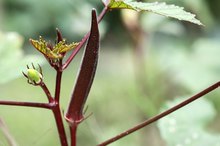Vitamins for an Eye Stye
A stye is a red lump that appears on the eyelid, causing irritation and redness. Much like an acne lesion, a stye is caused by a clogged hair follicle that becomes infected and fills with pus. Keeping the area clean and applying warm compresses is often all that is needed to clear the infection, although vitamins may help speed the process. Talk to your doctor before using vitamins to heal your eye stye.
If you are experiencing serious medical symptoms, seek emergency treatment immediately.
Echinacea
A historically used herb for cold, flu and infection, echinacea is a bright flower with medicinal parts. Nine species of the plant exist and thrive in the United States and parts of Canada. By stimulating the immune system, echinacea is believed to boost the body's infection-fighting abilities, helping to resolve illnesses quickly. Some people use echinacea as a skin-healing supplement. The efficacy of echinacea is not scientifically proven, however. Echinacea supplements are generally well tolerated, although some people experience allergic reactions. Talk to your doctor about the benefits of echinacea for eye styes.
- A historically used herb for cold, flu and infection, echinacea is a bright flower with medicinal parts.
- Some people use echinacea as a skin-healing supplement.
Goldenseal
Treatment for an Eye Cold
Learn More
Goldenseal is a centuries-old herb used to treat infections. Often combined with echinacea in over-the-counter herbal preparations, goldenseal is purported to enhance immune-system functioning. The active compound berberine, which exists in goldenseal, is believed to clear eye infections, although the effectiveness of individual goldenseal products varies based on the amount of berberine it contains. For most people, goldenseal is a safe supplement for short-term use, although rare side effects include nausea and vomiting. Talk to your doctor before using goldenseal as an eye stye treatment.
- Goldenseal is a centuries-old herb used to treat infections.
- For most people, goldenseal is a safe supplement for short-term use, although rare side effects include nausea and vomiting.
Multivitamins
Multivitamins help fill in nutritional holes for greater health and immunity. Although you may get many vitamins and minerals from your diet, there are times when your body may require more vitamins. A report from the Linus Pauling Institute explains that vitamins and minerals play an important role in regulating your immune system, and a deficiency can result in a weakened system and a lower resistance to negative health occurrences 6. Taking a multivitamin helps to boost overall health and lessen the occurrence of eye styes. Multivitamins containing zinc and antioxidant vitamins are especially helpful. Zinc is a trace element that is crucial to health. A widely used cold prevention supplement, zinc is a nutrient found in over-the-counter multivitamins and various products for immune-system enhancement. Antioxidant vitamins such as vitamins A, C and E, also support the immune system and help protect the eyes against bacteria and viruses.
- Multivitamins help fill in nutritional holes for greater health and immunity.
Related Articles
References
- EyeSmart: What Are Chalazia and Styes?
- National Center for Complementary and Alternative Medicine: Echinacea
- National Center for Complementary and Alternative Medicine: Goldenseal
- MedlinePlus: Zinc
- All About Vision: Vitamin A and Beta Carotene: Eye Benefits
- Linus Pauling Institute: Nutrition and Immunity 1
- Memorial Sloan Kettering Integrative Medicine About Herbs, Botanicals & Other Products. Echinacea. https://www.mskcc.org/cancer-care/integrative-medicine/herbs/echinacea
- Natural Medicines Database: Therapeutic Research Center. Echinacea. https://naturalmedicines.therapeuticresearch.com/databases/food,-herbs-supplements/professional.aspx?productid=981
- UCLA Center for East-West Medicine. The Echinacea Controversy: Herbal Remedy for Colds? https://exploreim.ucla.edu/wellness/the-echinacea-controversy-herbal-remedy-for-colds/
- Restani P, Di Lorenzo C, Garcia-Alvarez A, et al. Adverse Effects of Plant Food Supplements Self-Reported by Consumers in the PlantLIBRA Survey Involving Six European Countries. PLoS One. 2016;11(2):e0150089. doi:10.1371/journal.pone.0150089
- Senica M, Mlinsek G, Veberic R, Mikulic-petkovsek M. Which Plant Part of Purple Coneflower (Echinacea purpurea (L.) Moench) Should be Used for Tea and Which for Tincture? J Med Food. 2019;22(1):102-108. doi:10.1089/jmf.2018.0026
- Wanwimolruk S, Prachayasittikul V. Cytochrome P450 enzyme mediated herbal drug interactions (Part 1). EXCLI J. 2014;13:347-391.
- Karsch-Völk M, Barrett B, Kiefer D, Bauer R, Ardjomand-Woelkart K, Linde K. Echinacea for preventing and treating the common cold. Cochrane Database Syst Rev. 2014;2(2):CD000530. doi:10.1002/14651858.CD000530.pub3
- National Center for Complementary and Integrative Health. Echinacea. Updated September 2016.
- Brown PN, Chan M, Paley L, Betz JM. Determination of major phenolic compounds in Echinacea spp. raw materials and finished products by high-performance liquid chromatography with ultraviolet detection: single-laboratory validation matrix extension. J AOAC Int. 2011;94(5):1400-1410.
- Hudson JB. Applications of the phytomedicine Echinacea purpurea (Purple Coneflower) in infectious diseases. J Biomed Biotechnol. 2012;2012:769896. doi:10.1155/2012/769896
- Memorial Sloan Kettering Integrative Medicine About Herbs, Botanicals & Other Products. Echinacea.
- Natural Medicines Database: Therapeutic Research Center. Echinacea.
- UCLA Center for East-West Medicine. The Echinacea Controversy: Herbal Remedy for Colds?
Writer Bio
A health-care professional for more than 10 years, Rica Lewis has obtained numerous certifications in the industry. In 2006 she began channeling her knowledge into health-related articles for print and online publications. Her work has appeared in "Metroparent Magazine," "Anew Heart Healthcare Magazine" and community newspapers. Lewis earned a diploma from LongRidge Writers Institute.









